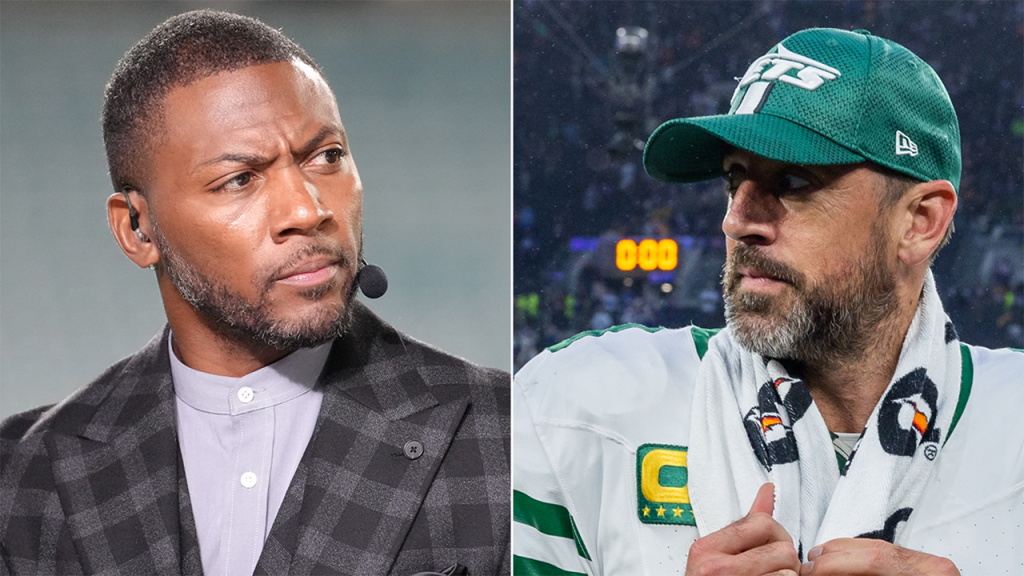The ongoing feud between New York Jets quarterback Aaron Rodgers and ESPN analyst Ryan Clark escalated following Rodgers’ comments suggesting critics should disclose their vaccination status. This seemingly innocuous remark ignited a fiery response from Clark, who delivered a scathing critique of Rodgers’ character and performance. Rodgers’ initial comments stemmed from his perception that talk show hosts and sports commentators have become overly influential and often offer uninformed opinions. He lamented the current media environment, where personalities gain celebrity status simply by discussing sports, even if their takes are “unfounded or asinine.” This critique, aimed at ESPN, the network that employs Clark and also features Rodgers on “The Pat McAfee Show,” triggered Clark’s initial accusation that Rodgers was a “fraud” and a “hypocrite.”
Clark’s subsequent video response on X (formerly Twitter) accused Rodgers of ongoing hypocrisy for criticizing ESPN analysts while simultaneously being paid by the network. He then addressed Rodgers’ vaccination status remark directly. Clark revealed he is vaccinated due to health conditions stemming from his NFL career, specifically the absence of his spleen and gallbladder. He emphasized that public concern surrounding Rodgers’ vaccination status wasn’t about the vaccination itself, but rather Rodgers’ perceived “slimy” and “deceitful” handling of the situation. Clark argued that Rodgers’ arrogance in addressing the issue exacerbated the controversy and that Rodgers himself has perpetuated the discussion since the initial incident.
Central to Clark’s criticism was the assertion that his analysis of Rodgers is based on film study and conversations with former teammates, not on Rodgers’ vaccination status. He pointed to Rodgers’ current quarterback rating (QBR), placing him 21st in the league, and the Jets’ disappointing 4-10 record as evidence of his on-field struggles. Clark challenged Rodgers’ tough-talking persona displayed on talk shows, asserting that he is unafraid of Rodgers and will continue to provide honest analysis regardless of Rodgers’ personal attacks. He highlighted the irony of Rodgers criticizing his attire while simultaneously underperforming on the field.
Rodgers’ comments about vaccination status, while seemingly intended to deflect criticism, backfired and provided Clark with ammunition for a pointed rebuttal. Clark’s response meticulously dissected Rodgers’ arguments, highlighting the perceived hypocrisy in criticizing ESPN while simultaneously working for the network. He underscored the public’s true concern with Rodgers’ handling of the vaccination issue, emphasizing the perceived deceit and arrogance rather than the vaccination itself.
This ongoing public exchange between Rodgers and Clark underscores the complex relationship between athletes, media personalities, and public perception. Rodgers’ attempt to shift the narrative by invoking vaccination status proved counterproductive, allowing Clark to leverage the opportunity to criticize both Rodgers’ character and on-field performance. The feud also highlights the heightened scrutiny faced by athletes in the age of social media and the 24/7 news cycle.
The incident serves as a microcosm of the broader media landscape, where personalities are often judged as much for their off-field behavior and public pronouncements as for their professional achievements. Rodgers’ comments, intended to dismiss criticism, ultimately amplified the very scrutiny he sought to avoid. Clark’s detailed response, dissecting Rodgers’ perceived hypocrisy and underwhelming performance, further intensified the public debate. This back-and-forth underscores the power dynamics inherent in the athlete-media relationship and the potential for seemingly minor comments to escalate into full-blown public feuds.

